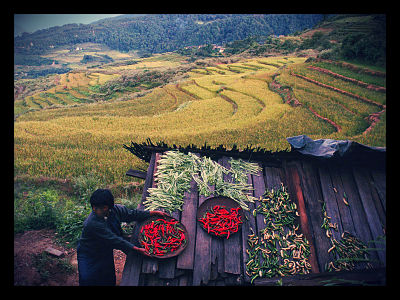Bhutan: World Leader in Organic Farming

Bhutan, a small country located in the Himalayan Mountains between China and India, has announced its plan to become the first country to use entirely organic agricultural methods. The country has demonstrated its commitment to sustainability in many of its policies and practices, and now Bhutan is a world leader in organic farming practices.
The country has not set a date for when the change will be complete. Minister of Agriculture and Forests Pema Gyamtsho stated, “Going organic will take time… We cannot do it tomorrow. Instead we will achieve it region by region and crop by crop.” Organic agriculture is a method of growing crops that uses no chemical fertilizers, pesticides, or herbicides.
Agrarian culture and lifestyle dominate Bhutan, where many politicians are also farmers, and most farmers already utilize organic growing methods. Minister Gyamtsho cited several reasons for the country’s push to go entirely organic, including increased food production. He hopes that Bhutan will increase its high quality food exports to neighboring India and China, while retaining food security for its citizens. Other reasons for the complete organic transition include the country’s strong Buddhist beliefs, and the negative effects of chemicals on the natural environment.
Like the rest of the world, Bhutan’s future depends on how it reacts to global issues such as climate change, population growth, and food security. While Bhutanese farmers who already practice organic methods surely support the government’s decision, other famers are unsure about growing crops without chemicals. In some regions, the last few years of warm temperatures and unpredictable weather have yielded smaller harvests and more pests. Some family farmers whose children have moved into the city are forced to use chemicals to maintain sufficient levels of productivity.
Nevertheless, the nutritious products of organic agriculture continue to be in high demand around the world. Organic farmers use natural methods to control pests and practice soil-building techniques, such as composting. Building and maintaining healthy soil is necessary for long-term sustainable agricultural systems. While there is debate over whether organic farming practices produce a lower yield per acre than conventional practices, there is no question that chemically based farming is detrimental to natural ecosystems.
With a population of around one million people, Bhutan is a unique country in many ways. Rather than using Gross Domestic Product (GDP) to measure prosperity and growth, Bhutan gauges its citizens’ productivity and health according to Gross National Happiness (GNH). As a world leader in organic farming practices, Bhutan will continue its track record of setting a standard for sustainable development that other countries can model.
– Kat Henrichs
Source: Guardian
Photo: NPR
